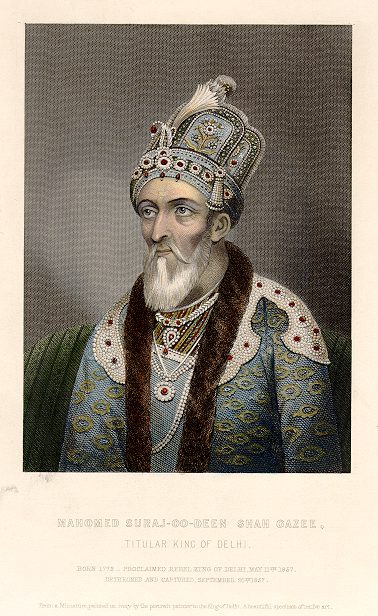FWP:
On the ambiguities of kyuu;Nkar , see {125,1}.
There's not much to be said about this one, is there? It forms a graceful frame for Zafar's line. I tracked down Zafar's original opening-verse (p. 412 in the 4th vol., 'Kulliyat-e Zafar' (Delhi: Bismah Kitab Ghar, 2002)):
na.siib-e va.sl tumhaaraa kaho to kyuu;Nkar ho
firaaq-e yaar me;N taskiin ho to kyuu;Nkar ho
[the destiny of union with you-- tell me, how would [it] occur/be?
in separation from the beloved, if there would be peace, then how would [it]
occur/be?]
Although Nazm makes a point of how difficult and intractable this ground is, Zafar has not only the 11-verse ghazal cited above, but also
=a 9-verse one in the same meter (G5) (p.248 in the 2nd vol.),
rhyme uur ; refrain ho to kyuu;Nkar
ho
=a 9-verse one (p.251 in the 2nd vol.) in meter G2, rhyme at
; refrain ho to kyuu;Nkar ho
=an 8-verse one (p.578 in the 2nd vol.) in meter G2, rhyme at
; refrain ho to kyuu;Nkar ho
=a 9-verse one (p.582 in the 2nd vol.) in meter G5, rhyme ar
; refrain dil ko nah ho kyuu;Nkar nah ho
=a 7-verse one (pp. 582-83 in the 2nd vol.) in meter G2, rhyme aanah
; refrain ho to kyuu;Nkar ho
These were the ones I found in a cursory search (the book
has no index). The obvious point is that Zafar, a fine poet in his own way, apparently had no trouble working with this meter and these rhyming
elements. So why would Ghalib have any trouble? Very often such alleged difficulties seem to exist only in the eye of the (much later) beholder.

Nazm:
The second line is Huzur's, and the ground is a commanded [farmaa))ishii] one in which rhymes are lacking. The author has achieved a wonder: he fulfilled the command in this ground. But it should be remembered that for an accomplished Ustad, everything is all right [ravaa]. Otherwise, it's better to avoid rhymes like [the ones in this ghazal]. (135)
== Nazm page 135